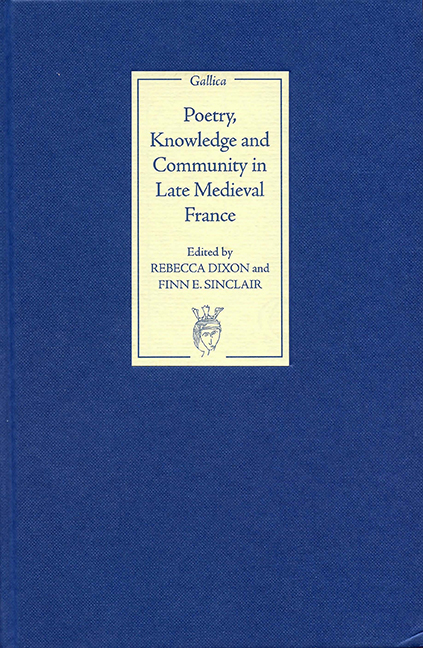Book contents
- Frontmatter
- Contents
- List of Illustrations
- List of Contributors
- Preface
- Introduction: L'Amour de Sophie. Poésie et savoir du Roman de la 1 Rose à Christine de Pizan
- PART I LEARNED POETRY/POETRY AND LEARNING
- 1 Poetry and the Translation of Knowledge in Jean de Meun
- 2 Apprendre à jouer? Fonctions de la partie d'échecs des Eschés amoureux
- 3 Jean Gerson, Poet
- 4 Gerson and Christine, Poets
- Part II Poetry or Prose?
- Part III Poetic Communities
- Conclusion: Knowing Poetry, Knowing Communities
- Bibliography
- Index
- Miscellaneous Endmatter
3 - Jean Gerson, Poet
from PART I - LEARNED POETRY/POETRY AND LEARNING
Published online by Cambridge University Press: 25 October 2017
- Frontmatter
- Contents
- List of Illustrations
- List of Contributors
- Preface
- Introduction: L'Amour de Sophie. Poésie et savoir du Roman de la 1 Rose à Christine de Pizan
- PART I LEARNED POETRY/POETRY AND LEARNING
- 1 Poetry and the Translation of Knowledge in Jean de Meun
- 2 Apprendre à jouer? Fonctions de la partie d'échecs des Eschés amoureux
- 3 Jean Gerson, Poet
- 4 Gerson and Christine, Poets
- Part II Poetry or Prose?
- Part III Poetic Communities
- Conclusion: Knowing Poetry, Knowing Communities
- Bibliography
- Index
- Miscellaneous Endmatter
Summary
Pourquoi cette metamorphose? Pourquoi le theologien se transforme-t-il en poete?… Au XVe siecle, il est beaucoup trop tard pour inventer la poesie chretienne: mais la poesie mystique d'expression latine?
Et quis in hoc evo scire poemata vult?
Que meliora potest exclusus ab omnibus, exsul,
Officiis? Sed nec carmina flere vetant.
[And who in our time wants to learn poems? What better things has the man excluded, exiled, from every office, to do? But songs do not prevent one from weeping.]
In 1955, Max Lieberman observed that the poems of the prolific Jean Gerson had received far less attention from scholars than had his many other writings. This remains the case. Gerson is still best known to Anglophone literary scholars as the avowedly anti-heretical critic of the Roman de la Rose. But it has recently become possible to consider whether his poetry might fit with a number of new critical and historical narratives that seek to see Gerson whole and to consider him as an example of a new kind of public intellectual that emerged in late-medieval Europe and typically functioned as an intermediary between different social cadres, lay and clerical, scholastic and extramural. One way of pursuing a similar line of enquiry is to consider how Gerson's poetic output interacted with, and sometimes may have substituted for, the kinds of diplomatic, pastoral and political action that had made him a prominent figure in French public life and further abroad. For example, the years 1417 and 1418 were years of personal and professional crisis for Gerson, as the Council of Constance drew to an end without his having achieved either of his personal aims (the establishment of a feast day for St Joseph and the posthumous censure of Jean Petit for heresy). He was forced into temporary exile, seeking shelter from supporters of the Burgundy faction of the French aristocracy, who might have been angered by his stance towards Petit. But the period of professional frustration at Constance inaugurated a seminal moment in the development of his poetry. He wrote two major literary works during and after Constance: the Biblical epic Josephina and the De consolatione theologiae, in which he exploits and appropriates the stylistic resourcefulness of Boethius, alternating prose dialogues with poetry in a variety of metres. Far from remaining in Boethius's shadow, he confidently uses the auctor as a point of departure.
- Type
- Chapter
- Information
- Poetry, Knowledge and Community in Late Medieval France , pp. 56 - 68Publisher: Boydell & BrewerPrint publication year: 2008

